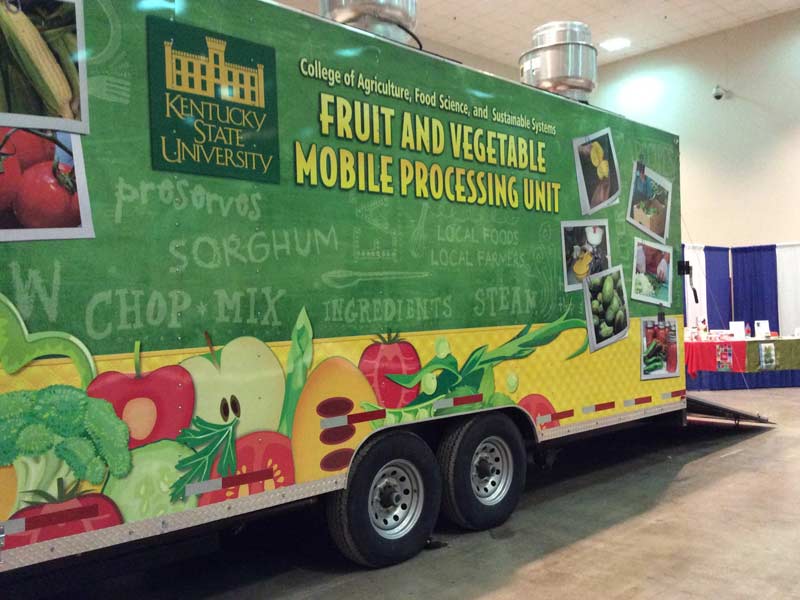
CHARLESTON, W. Va. — Vocational agriculture teacher Gary Selby, hired in September, is rebuilding an ag program at Tolsia High School in rural Wayne County, West Virginia, from scratch.
“You know what it’s like starting a farm? That’s what we’re doing right now,” he said as he talked about scrounging around for anything he can get his hands on for supplies and equipment.
That pile of galvanized pipe discarded when a fence around the football field was torn down? He and his students grabbed that up. “We’ve been using that for everything.”
Selby joined 600 farmers and other agricultural proponents at the West Virginia Small Farm Conference, Feb. 25-27, at the Charleston Civic Center. And he modeled why conference founder Tom McConnell is bullish on farming in the Mountain State.
“Things are changing in West Virginia,” said McConnell, program leader with the West Virginia University Extension Service Small Farm Center. “There’s never been as much optimism or potential to look at farming, the business of raising food.”
“We need more farmers.”
Full schedule
And if anyone can single-handedly increase the state’s agricultural base, it’s McConnell, a West Virginia native who has been working for WVU Extension for more than 40 years. He confesses that when it comes to the subject of small farms, “I’m pretty aggressive.”
The passionate educator-farmer has built the Small Farm Conference, now in its 12th year, into a multi-state, multi-themed, multi-day farm program, geared toward growers and food. This year’s conference offered intensive sessions ranging from wholesale marketing and Farm to School programs to processing, food safety, branding and everything in between.


Full-day workshops included a better process control school that fulfilled federal and state requirements for commercial operations; a training session on QuickBooks; and another workshop on Good Handling Practices/Good Agricultural Practices (GHP/GAP) certification. Longer, four-hour workshop sessions on the opening day provided for more in-depth coverage on topics that just can’t be covered in a typical 50-minute workshop session.
Rebirth
West Virginia, a rural state, has always had its roots in agriculture. But over the past 75 years, jobs in the steel mills, coal mines and other industries drew people away from those roots, said West Virginia Commissioner of Agriculture Walt Helmick Feb. 25 during the conference luncheon.

“As we diversified our economy, we lost sight of agriculture,” Helmick said. “But the opportunity remains. The land is still there; we know that we can revitalize it.”
Helmick said today’s farmer needs to apply technology to the process to remain competitive. “Agriculture is an industry, not to be looked down on, but looked up to.”
Farmers market
On Thursday afternoon, more than 30 vendors showcased their food and farm products at the Winter Blues Farmers’ Market, held for the second year in conjunction with the Small Farm Conference at the Civic Center.
And they did more than showcase — they also did a lot of selling, ringing up a quick $25,000 in product sales, more than double 2015’s total, according to the West Virginia Department of Agriculture.
Although there are now 95 farmers markets in West Virginia, McConnell’s goal is for farmers to take the leap from the farmers market to a larger market “that makes a difference” in terms of personal farm income, jobs and economic development.
Since the 1980s, for example, he’s been trying to get more West Virginia-grown food into schools, a movement that is gaining more steam through the national Farm-to-School program.
Missed opportunity
Making the leap also means delving into processing farm products. A farmer in West Virginia gets only 11 cents of each dollar spent on food, but food processing nets another 35 cents, McConnell said.

But McConnell isn’t talking about large-scale farming, he’s talking about missed opportunity by small farmers that make up the bulk of the state’s 23,000 farmers. “We have to talk about food, not commodities,” he explained. “There’s just amazing opportunity.”
And he feels so strongly, he repeats it. “Just amazing opportunity.”
“The catch is that we need to understand entrepreneurship.”
And developing that self-employed business model is something Wayne County’s Patrick Fluty also recognizes as key to building West Virginia agriculture in communities and among residents who relied on the coal mines or industry for their livelihoods.
“The mindset has to be changed,” he said. “It is a culture change. Now you’re on your own.”
Fluty is a farmer and veteran of the coal mines whose background is also education. He’s a contract “school improvement coach,” but he says he’s promoting agriculture countywide, not just in the schools, and is helping organize a farmers’ co-op in his county.
“It’s wide open,” Fluty said. “There’s no other industry, so farming has got to be the answer.”











